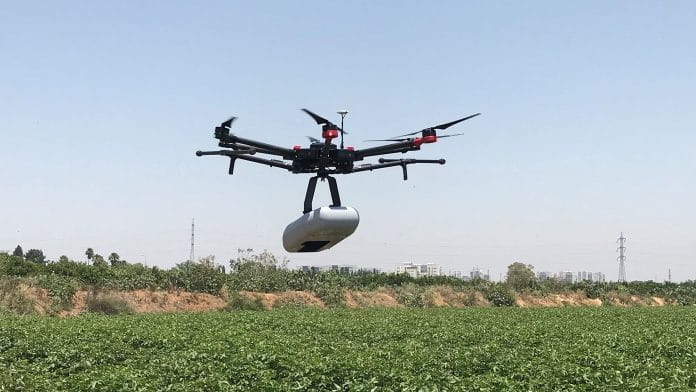New Delhi: Flying a drone in Delhi’s Vijay Chowk, areas surrounding strategic locations notified by the Ministry of Home Affairs, central secretariats in state capitals and eco-sensitive zones will now be off-limits and attract a penalty of Rs 50,000 for individuals.
According to the Unmanned Aircraft System Rules, 2021 notified by the government Friday, a drone cannot be operated within five kilometre of international airports at Mumbai, Delhi, Chennai, Kolkata, Bengaluru and Hyderabad, and at a distance of three kilometre from the perimeter of any civil, private or defence airport.
The rules further state that the drones cannot be flown within a distance of 25 km from international borders which includes Line of Control, Line of Actual Control and Actual Ground Position Line. Areas around military installations or where military activities take place are also prohibited, unless clearance is obtained from the local military facility.
The new rules come at a time when India’s drone industry is projected to grow. From surveillance purposes during Covid lockdown to helping tackle locust attack, the central government has been increasingly deploying drones to aid governance.
The rules classify drones based on weight, specify who is eligible to import, manufacture, trade, own or operate an unmanned aircraft, places where drones can be operated, and fine to be imposed if the rules are broken.
Also read: Drones can make Covid vaccine delivery a success — if Modi govt can just tweak its policy
DGCA nod and penalty
Individuals and companies are required to obtain approval from the Directorate General of Civil Aviation (DGCA) to import, manufacture, trade, own or operate drones.
Any individual importing, manufacturing, trading, owning or operating drones must be a citizen of India and above 18 years of age. In case of a company, it must be registered and have its principal place of business in India, and the chairperson and at least two-thirds of its directors must be citizens of India.
Prior permission from the DGCA is needed to manufacture or import a prototype unmanned aircraft system. No drone can be operated without a valid certificate of manufacture and airworthiness issued by the DGCA, the rules state.
The rules also specify a penalty between Rs 25,000 to Rs 5 lakh, depending on the offence committed. A fine of Rs 5 lakh can be imposed if sub-section (1) of section (10) — “no person other than an authorised importer shall import an unmanned aircraft system or parts or components thereof in India” — is violated. Same goes for violation of section (11) that underlines how only an Authorised Unmanned Aircraft System Manufacturer can manufacture a drone.
A penalty of Rs 50,000 will be imposed on individuals who operate a drone over a no-operation area.
Meanwhile, a fine between Rs 25,000 to Rs 50,000 will be imposed if an individual imports, manufactures, buys, sells or leases an unauthorised unmanned aircraft system.
‘Step in the right direction but rules not customised for India’
Drones are divided into five categories based on their weight — nano unmanned aircraft, micro unmanned aircraft, small unmanned aircraft, medium unmanned aircraft, and large unmanned aircraft.
Rules for each of these drones vary. All drones, except the nano unmanned aircraft, require a licensed pilot and permit from the DGCA. Altitude and speed restrictions also vary depending on the category of the drone.
To obtain a remote pilot licence, a person must be above 18 and below 65 years of age, and must have passed Class 10 or its equivalent examination from a recognised Board. A certificate of medical fitness and training and skill test report — where details of both must be specified by the DGCA — is also required.
The rules further state that a penalty of Rs 25,000 will be imposed on a person operating the drone without a remote pilot licence.
Citing several similarities with the drone rules under the US Federal Aviation Administration, Mark Martin, CEO of Martin Consultancy, a Dubai-based aviation firm said, “These rules are not customised for India.”
“It is a step in the right direction but it needs to be more maturely thought through. India is not the US, UAE or the UK. A lot of markets have been very conservative on drone restrictions,” Martin told ThePrint.
Stressing on how it all depends on the implementation of these rules, he said, “It is certainly encouraging but there needs to be a balance of implementation and safety. How this will pan out is pretty much anyone’s guess.”
Also read: Covid, floods, locusts — India’s nascent drone industry helps govt fight many challenges






